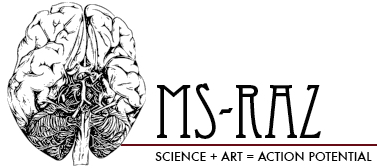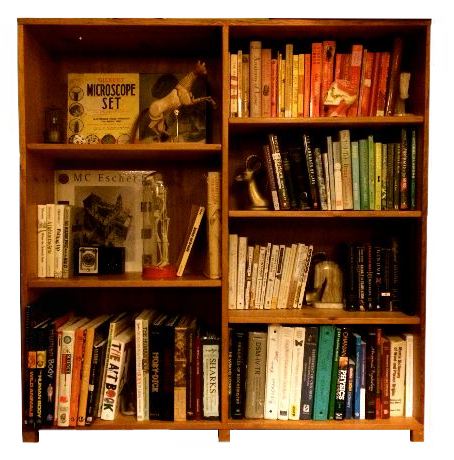The Bookcase.
What does your bookcase say about you? What do you say about your bookcase? What do you say to your bookcase? Does your bookcase say something to you? Does it say, "Come here... Sit down. Pick a book. Take a moment to expand your mind..."
What a treasure trove of information. Few other visual stimuli represent in such a concise way a timeline of thought, or thought growth. For most of us, a whole bookshelf of books is not read in a month or even a year. Books require an investment. Effort. Time. Most bookcases are filled over the course of years, studies, and vacillating interests.
Before looking at the books, how are the books organized? The three right shelves from the top are color coordinated because topics vary too much, but they are all considered interesting-lend-out-books. Then reference and textbooks. And to the left anatomy, art, and my collection of pop up books. So aesthetic and some genre organization. Some people organize alphabetically or by theme which is more semantic (and by all standards much more useful than color coordinating). Or by size, similar to color in that it is aesthetic. Or perhaps there is no organization at all. Rather, there is a Jenga tower of books that could collapse when the next piece is added to the top. Could these modes of organization allude to the way a person's mind is organized? Or how a person organizes data (semantically vs visually). Perhaps... What do the books themselves look like? Are they pristine? Tattered? Annotated, flagged, and dog eared? Do these types of attribute suggest something about how a person notes or remembered things? Perhaps... As a word of caution, you should never base an entire trait or concept of an individual on one single item, even when certain items seem to announce exactly what they suggest, such as an innocuous copy of "Story of O" tucked in a small nightstand bookshelf. Or a copy of the DSM-IV-TR at hand's reach.
But still... Perhaps something more beneficial to be aware of are the sorts of questions items, these bits of information, could suggest about a person rather than what an item itself says. For example... Hm, there are three books on olfaction, perhaps they are interested in smells. "What are some of your favorite smells?" Boom. Conversation. Anatomy books and trinkets... "Do you like Leonardo da Vinci's, oh yes- you do. I see your da Vinci pop up book."
With the right bits of information, such as the data contained within a book collection, a vast sea of question one could ask emerge. Noticing these little things can serve as cues, a path leading to the most engaging and insightful questions to ask a person. Next time you are in a person's house, sneak a peak at their book collection. (If there are no books, leave.)
For more about what your stuff says about you: Snoop by Sam Gosling

